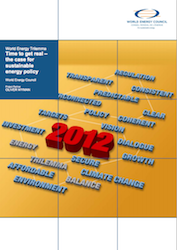 According to the World Energy Council (WEC), the world is far away from achieving environmentally sustainable energy systems. According to the organization’s global ranking of country energy sustainability performance, over 90 countries assessed are still far from achieving fully sustainable energy systems.
According to the World Energy Council (WEC), the world is far away from achieving environmentally sustainable energy systems. According to the organization’s global ranking of country energy sustainability performance, over 90 countries assessed are still far from achieving fully sustainable energy systems.
The 2012 Energy Sustainability Index, published within the WEC’s 2012 World Energy Trilemma report, “Time to get real – the case for sustainable energy policy,” finds that most countries still have not managed to balance the energy trilemma. The WEC argues that countries must balance the trade-offs between the three challenges of the trilemma: energy security, social equity, and environmental impact mitigation, if they are to provide sustainable energy systems.
The Index reveals that:
- Environmental impact mitigation remains a universal problem;
- Providing high-quality and affordable energy access remains a significant challenge for developing and emerging economies; and
- Countries at various stages of development struggle with energy security.
“The message of the Energy Sustainability Index is clear: all countries are facing challenges in their transition towards more secure, environmentally friendly, and equitable energy systems,” said Pierre Gadonneix, Chairman of the World Energy Council. “What makes the difference is how they set their final goals, how they balance market economics and public policies, and how they design the smartest policies in order to promote efficiency and to optimise costs, resources and investments for the long term. If we are to have any chance of delivering sustainable energy for all and meeting the +2°C goal, we need to get real.”
 This year, for the first time, the Energy Sustainability Index comes with a set of country and regional performance profiles. The Index captures and aggregates country-level data to outline the relative energy performances and contextual attributes of the WEC’s member countries. Its global findings show that environmental impact mitigation remains a universal program; for many developing and emerging economies, providing high-quality and affordable energy access remains a significant challenge; and countries at various stages of development struggle with energy security.
This year, for the first time, the Energy Sustainability Index comes with a set of country and regional performance profiles. The Index captures and aggregates country-level data to outline the relative energy performances and contextual attributes of the WEC’s member countries. Its global findings show that environmental impact mitigation remains a universal program; for many developing and emerging economies, providing high-quality and affordable energy access remains a significant challenge; and countries at various stages of development struggle with energy security.
Joan MacNaughton, executive chair of the World Energy Trilemma report, concluded, “As countries industrialise, their environmental impact increases. How to tackle this has been and will remain a major challenge for all policymakers. But all countries – whether they are developing or already developed – must decrease their environmental impact while supporting affordable and accessible energy. The Energy Sustainability Index pinpoints the areas where countries need to work harder.”

